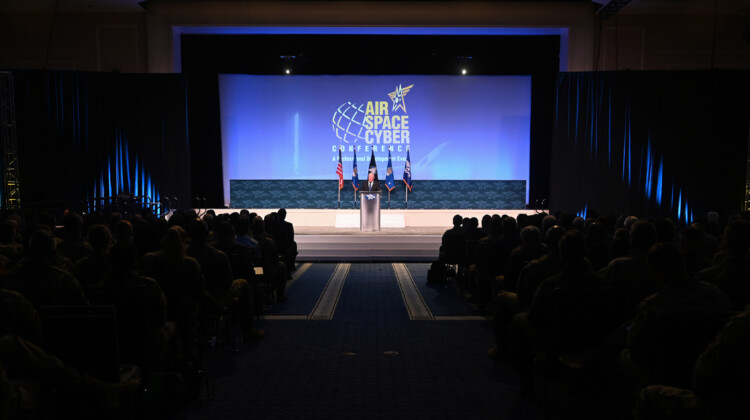Air Force Secretary highlights China’s growing threat and the imperative for swift modernization.
In a powerful and sobering address earlier this week, Secretary of the Air Force Frank Kendall laid out a detailed tutorial on why China has emerged as America’s preeminent security threat.
Kendall’s Urgent Call for Modernization and Great Power Competition Awareness
Speaking at the Air and Space Forces Association’s Air, Space, and Cyber Conference in National Harbor, Maryland, Kendall emphasized the need for rapid modernization and adaptation within the Air Force and Space Force to safeguard the nation’s security and interests.
Kendall’s speech held particular significance as it coincided with the 22nd anniversary of the 9/11 terrorist attacks, which profoundly shaped America’s security focus. He highlighted the imperative to shift from a counterterrorism-centric posture to one that recognizes the emerging competition among “great powers.”
“While the threat of attack from violent extremist organizations still exists, China is by far our pacing challenge,” Kendall asserted, underscoring the urgency of adapting to this evolving threat landscape.
One of Kendall’s key points was the need for Congress to act swiftly, urging lawmakers to overcome the deadlock in confirming military nominations, pass a full-year budget, and prevent government shutdowns. These are essential steps to ensure the military’s readiness in the face of emerging challenges.
Kendall stressed that while the current security environment is turbulent, war is not inevitable. “Our job is to deter that war and to be ready to win if it occurs,” he declared. He emphasized the critical role of the Air and Space Forces in preventing conflicts and safeguarding American interests.
China’s Military Advancements: A Growing Threat to U.S. Dominance in the Pacific
Over the past two decades, China’s aggressive posture and military advancements were a focal point of Kendall’s address. Kendall pointed out that China had strategically optimized its forces for great power competition and aimed to prevail over the United States in the Western Pacific.
To support his assertions, the Air Force Secretary highlighted China’s creation of two new military services: the Rocket Force, specifically designed to target America’s high-value assets, including aircraft carriers and forward airfields, and the Strategic Support Forces, which concentrates on achieving information dominance in space and cyber domains.
Kendall’s message echoed a memo he had distributed to the entire Air Force and Space Force on September 5, where he emphasized the need for a faster and more focused commitment to his Operational Imperatives, designed to address the challenges posed by China, Russia, and North Korea. These imperatives call for a comprehensive reevaluation of how the Air Force and Space Force are organized, trained, and equipped.
Kendall identified Taiwan as a dangerous pivot point, drawing parallels to Russia’s actions in Ukraine. He urged the audience to consider the risk of China attacking Taiwan in the coming years and emphasized the severe consequences of not adequately deterring Chinese aggression.
Operational Imperatives: Reshaping the Air Force and Space Force
The heart of Kendall’s strategy lies in his “Seven Operational Imperatives,” which align with the National Security Strategy and aim to reshape the Air Force and Space Force to meet the evolving challenges posed by China and other adversaries.
Earlier this year, Kendall unveiled this increasingly urgent roadmap to achieve the services’ modernization goals, explaining how these imperatives “if we don’t get them right, we will have unacceptable operational risk.”
The Seven Operational Imperatives of the Department include:
- Defining Resilient and Effective Space Order of Battle and Architectures;
- Achieving Operationally Optimized Advanced Battle Management Systems (ABMS) / Air Force Joint All-Domain Command & Control (AF JADC2);
- Defining the Next Generation Air Dominance (NGAD) System-of-Systems;
- Achieving Moving Target Engagement at Scale in a Challenging Operational Environment;
- Defining optimized, resilient basing, sustainment, and communications in a contested environment;
- Defining the B-21 Long Range Strike Family-of-Systems;
- Readiness of the Department of the Air Force to transition to a wartime posture against a peer competitor.
While he acknowledged mixed progress in these efforts during his Monday speech, Kendall expressed confidence in the path forward, especially regarding modernization.
However, he also acknowledged that certain aspects required a closer examination and openness to significant changes to align with the National Defense Strategy. The primary goal is to optimize the Air Force and Space Force for integrated deterrence, campaign support, and enduring advantage against potential adversaries.
Despite the formidable challenges posed by China, Kendall expressed unity and determination among the Department of the Air Force, allies, partners, and the entire government. He reassured that China’s ambitions would ultimately fail, and he attributed this confidence to the initiative, professionalism, and dedication of Airmen and Guardians.
~
In closing, Secretary Frank Kendall’s address delivered a stark wake-up call to the nation, emphasizing the urgency of modernizing and adapting the Air Force and Space Force to meet the growing threat from China. It is a call to action that underscores the critical importance of preparedness in safeguarding America’s security and interests in an evolving global landscape.










COMMENTS